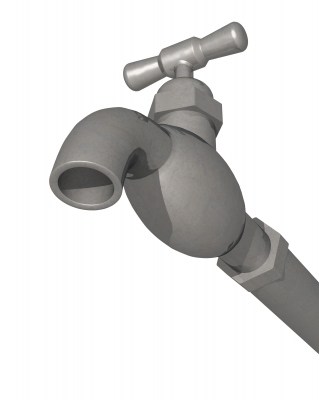Drink enough water to turn your urine light yellow
Drinking enough water is one of the most simple, basic, and important health steps you can take. As long as you are not taking riboflavin (vitamin B2), which fluoresces and turns your urine bright yellow (it is also in most multi-vitamins), then your urine should be a very light-colored yellow. If it is a deep yellow then you are likely not drinking enough water.
If you drink the required amount of water to maintain a light yellow coloring, you can easily avoid dehydration, which can have profound effects on your health. Dehydration can cause fatigue, dry skin, headaches, and constipation
Drink your water at the right rate.
It's better to sip water all day long than to guzzle a large amount all at once. Depending on your size, your body can only process a bit more than a glass of water per hour. If you drink much more than this at one sitting, the extra water will not be used, but merely flushed down the toilet bowl. So keep your water bottle with you all day long. If you wait until you are thirsty, though, it may be too late.
Drink pure water.
Healthy water is water that has been properly treated to avoid contamination. Nearly all municipal water supplies have chlorine and flouride added during water treatment, both of which are detrimental to your health. Europeans have known for many years that fluoride is toxic and have long since removed it from their water supplies. Be sure and obtain a filter to avoid ingesting chlorine and fluoride. About 5 percent of the water supplies in the U.S. also contain arsenic levels that can cause you health problems. In addition, there are many tons of drugs flushed down the toilet that may end up in your water supply – most filtration systems are not designed to remove them. Filter your water. There are two main types of filters that I recommend – either carbon filters or reverse osmosis.
Avoid bottled water. This kind of water is usually acceptable, but it's expensive and also negatively impacts the environment. And, despite its hefty price tag, bottled water is NOT an assurance of purity. Near 40% of bottled water is just plain old tap water which may or may not have received any additional treatment.
Store your water safely. Avoid purchasing the one-gallon cloudy plastic (PVC) containers from your grocery store as they transfer far too many chemicals into your water. The five-gallon containers and the clear bottles (polyethylene) are a much better plastic and will not give the water an unpalatable plastic taste.
Use lemon juice for a bit of flavor and normalize your body's pH.
You can add lemon juice to your water occasionally, to help flavor it and normalize your body's pH if you're too acidic. However, be careful not to use the lemon juice continuously or you run the risk of developing an allergy to it.
Watch the other fluids you drink…
Coffee and tea: Coffee in moderation (1-2 cups daily) is ok unless you are pregnant. Caffeine has clearly been associated with pregnancy complications and should be avoided by all pregnant women. If you struggle with insomnia or anxiety, please avoid all caffeine. Generally tea is an excellent beverage – try to stick with white or green teas which have higher antioxidant content.
Alcohol: Beer, wine, and distilled spirits are allowed in moderation. Moderate alcohol intake is defined as a 5-ounce glass of wine, a 12-ounce beer or 1 ounce of hard liquor with a meal. You will have to count these as carbohydrates, however. And remember that alcohol while hasten your dehydration.
Fruit jucies: Seek to limit them as much as possible as they contain large amounts of sugar. Avoid all soft drinks! I don't ever advocate drinking any soft drink for any reason as they have no redeeming value whatsoever. Both regular and diet sodas are potent contributors to a number of health challenges. For example, did you know that for every can of soda you drink per day, your risk of obesity increases by 60 percent! This is one of the easiest changes you can make that can significantly improve your health.
* These statements have not been evaluated by the Food and Drug Administration. The product mentioned in this article are not intended to diagnose, treat, cure, or prevent any disease. The information in this article is not intended to replace any recommendations or relationship with your physician. Please review references sited at end of article for scientific support of any claims made.



















Share: